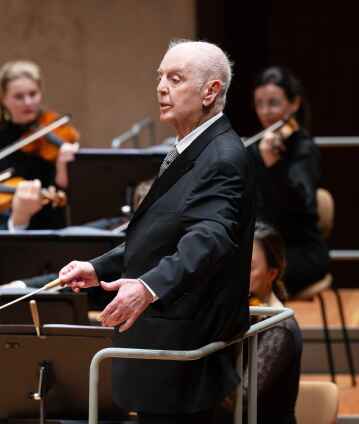Daniel Barenboim conducts Schubert and Beethoven

Schubert’s Seventh Symphony is shrouded in mystery – not only because it remained unfinished, but also because its inner turmoil allows us to look deep into the soul of Romanticism: anxiety and distress, idyll and joie de vivre are closely intertwined. Daniel Barenboim, honorary conductor of the Berliner Philharmoniker, juxtaposes this work with Beethoven’s Seventh – a symphony that knows no doubts, and radiates both optimism and fighting spirit. The programme opens with Weber’s Oberon overture.
In the autumn of 1823, Franz Schubert was living with his friend Franz von Schober and working on a symphony in B minor, a “black” key (Beethoven) that was unusual for this genre at the time. Schubert, aged 25 – his symphonic oeuvre was virtually complete at this point – was suffering not only from financial difficulties, but also from the effects of syphilis, which would lead to his death a few years later. He wrote two movements of the symphony before turning his attention to other projects. Almost four decades after Schubert’s death, the Viennese court conductor Johann von Herbeck found the manuscript and shortly afterwards premiered the Unfinished Symphony to great acclaim.
This unsolved mystery in music history is shrouded in legend: why did Schubert leave his Seventh Symphony incomplete? Is the title unjustified, given that Schubert actually considered the symphony to be complete, albeit unusually short? Could the last two movements have been lost? The most likely explanation is that Schubert was in fact prevented from completing the work – by commissions for compositions, his attempt to conquer the Vienna opera scene and, ultimately, his early death. The fact is that anyone who hears the symphony falls under its spell. Schubert’s unique language is clearly evident in the Unfinished Symphony, as Eduard Hanslick noted at the premiere: “When after several introductory bars, the clarinet and oboe in unison strike up their sweet song over the quiet murmur of the violins, then every child knows the composer, and the half-suppressed exclamation ‘Schubert’ passes whispered through the hall.”
In contrast to Schubert, who composed in a more associative manner, Beethoven followed a consistent logic in his symphonic works: his Seventh is a further development of the Fifth, in which the cosmos of the entire work grows out of a single, rhythmically distinctive motif. Beethoven opens up for us a “spiritual realm of the infinite”, according to E.T.A. Hoffmann. Schubert’s Unfinished Symphony and Carl Maria von Weber’s fairy-tale Oberon overture, with which Daniel Barenboim opens this Romantic programme, already venture deep into this realm.
© 2025 Berlin Phil Media GmbH
Artists
Our recommendations
- 2010 Europakonzert from Oxford with Daniel Barenboim and Alisa Weilerstein
- Daniel Barenboim and Martha Argerich
- Daniel Barenboim and Yefim Bronfman perform Brahms’s Piano Concerto No. 1
- Daniel Barenboim conducts the 2014 Europakonzert in Berlin
- Daniel Barenboim and Martha Argerich
- Daniel Barenboim conducts the Berliner Philharmoniker at the Staatsoper Unter den Linden